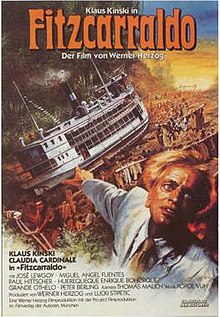Fitzcarraldo
| Fitzcarraldo | |
|---|---|

German film poster
|
|
| Directed by | Werner Herzog |
| Produced by | Werner Herzog Lucki Stipetić |
| Written by | Werner Herzog |
| Starring |
Klaus Kinski Claudia Cardinale José Lewgoy |
| Music by | Popol Vuh |
| Cinematography | Thomas Mauch |
| Edited by | Beate Mainka-Jellinghaus |
|
Production
company |
|
| Distributed by | Filmverlag der Autoren (BRD) |
|
Release date
|
|
|
Running time
|
157 minutes |
| Country | West Germany |
| Language | German Spanish Asháninka (Shot in English) |
| Budget | DM 14 million |
Fitzcarraldo is a 1982 West German surreal adventure-drama film written and directed by Werner Herzog and starring Klaus Kinski as the title character. It portrays would-be rubber baron Brian Sweeney Fitzgerald, an Irishman known in Peru as Fitzcarraldo, who is determined to transport a steamship over a steep hill in order to access a rich rubber territory in the Amazon Basin. The film is derived from the historic events of Peruvian rubber baron Carlos Fitzcarrald.
Brian Sweeney "Fitzcarraldo" Fitzgerald (Klaus Kinski) is an Irishman living in Iquitos, a small city east of the Andes in the Amazon Basin in Peru in the early part of the 20th century, when the city grew exponentially during the rubber boom. He has an indomitable spirit, but is little more than a dreamer with one major failure already behind him – the bankrupted and incomplete Trans-Andean railways. A lover of opera and a great fan of the internationally known Italian tenor Enrico Caruso, he dreams of building an opera house in Iquitos. Numerous Europeans and North African Sephardic Jewish immigrants have settled in the city at this time, bringing their cultures with them. The opera house will require considerable amounts of money, which the booming rubber industry in Peru should yield in profits. The areas in the Amazon Basin known to contain rubber trees have been parceled up by the Peruvian government and are leased to private companies for exploitation.
Fitzcarraldo explores entering the rubber business. A helpful rubber baron points out on a map the only remaining unclaimed parcel in the area. He explains that while it is located on the Ucayali River, a major tributary of the Amazon, it is cut off from the Amazon (and access to Atlantic ports) by a lengthy section of rapids. Fitzcarraldo sees that the Pachitea River, another Amazon tributary, comes within several hundred meters of the Ucayali upstream of the parcel. He plans to investigate that.
...
Wikipedia
